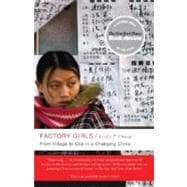
Note: Supplemental materials are not guaranteed with Rental or Used book purchases.
Purchase Benefits
What is included with this book?
Leslie T. Chang lived in China for a decade as a correspondent for the Wall Street Journal. She is married to Peter Hessler, who also writes about China. She lives in Colorado.
| The City | |
| Going Out | p. 3 |
| The City | p. 17 |
| To Die Poor Is a Sin | p. 44 |
| The Talent Market | p. 72 |
| Factory Girls | p. 98 |
| The Stele with No Name | p. 120 |
| Square and Round | p. 171 |
| Eight-Minute Date | p. 206 |
| Assembly-Line English | p. 246 |
| The Village | |
| The Village | p. 269 |
| The Historian in My Family | p. 303 |
| The South China Mall | p. 334 |
| Love and Money | p. 360 |
| The Tomb of the Emperor | p. 377 |
| Perfect Health | p. 388 |
| Sources | p. 409 |
| Acknowledgments | p. 417 |
| A Reader's Guide | p. 421 |
| Table of Contents provided by Ingram. All Rights Reserved. |
The New copy of this book will include any supplemental materials advertised. Please check the title of the book to determine if it should include any access cards, study guides, lab manuals, CDs, etc.
The Used, Rental and eBook copies of this book are not guaranteed to include any supplemental materials. Typically, only the book itself is included. This is true even if the title states it includes any access cards, study guides, lab manuals, CDs, etc.
Excerpted from Factory Girls: Voices from the Heart of Modern China by Leslie T. Chang
All rights reserved by the original copyright owners. Excerpts are provided for display purposes only and may not be reproduced, reprinted or distributed without the written permission of the publisher.